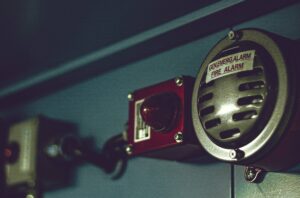A chirping fire alarm is almost always a maintenance alert, usually signaling a low battery or that the unit has reached the end of its life. This guide will help you quickly find the cause and stop the noise, as the sound is designed to be a helpful reminder, not a sign of immediate danger.
TL;DR: Your fire alarm is likely chirping because its battery is low. If you’ve changed the battery and it persists, the alarm is probably over 10 years old and needs replacing.
Key Takeaways
- A single, repeating chirp is a maintenance alert, while a loud, continuous three-beep pattern is an emergency alarm.
- The most common reason for a fire alarm chirping is a low battery, which is an easy fix you can do yourself.
- All smoke alarms have a limited lifespan, typically 8-10 years, and will chirp to let you know they need replacing.
- Hard-wired alarms also have backup batteries that need changing and can be affected by power interruptions.
- If you’ve tried everything, a simple reset procedure can often drain residual power and solve the problem for good.
- A single, intermittent “chirp” that happens every 30 to 60 seconds is a maintenance request. It’s the alarm’s way of telling you it needs something, like a new battery.
- A loud, continuous, three-beep pattern is a full-blown emergency alarm. This sound means the alarm has detected smoke or a potential fire, and you should follow your fire safety plan immediately.
- Gently twist the main body of the smoke alarm to detach it from its mounting bracket on the ceiling.
- Find the battery compartment. You may need to slide a small cover open.
- Remove the old battery. It’s usually a 9-volt or a pair of AA batteries.
- Insert the brand-new battery, making sure the positive (+) and negative (-) terminals line up correctly.
- Press and hold the ‘Test’ button on the alarm for a few seconds. It should make a loud beep to confirm it’s working.
- Reattach the alarm to its mounting bracket. The chirping should now be gone. For more tips on a beeping home alarm, here’s what to do.
- Disconnect the alarm. If it’s hard-wired, unplug its power harness.
- Remove the battery from the alarm.
- With the battery out, press and hold the ‘Test’ button for about 15-30 seconds. This will drain all leftover power.
- Install the new battery and reconnect the power harness if it’s a hard-wired unit.
- Press the ‘Test’ button again to confirm it’s working properly. The chirping should finally stop.
First, Is It a Chirp or an Emergency Alarm?
Before you do anything, it’s important to understand what the sound means. A fire alarm makes two very different noises for different reasons. One is a request for your attention, and the other is a warning of danger.
Understanding this difference is the first step. If you’re hearing the single chirp, keep reading to find the simple fix.
The 5 Most Common Reasons for a Chirping Fire Alarm
That annoying chirp is almost always caused by one of a few simple issues. Here’s how to figure out what’s going on and sort it out quickly.
1. Low Battery: The #1 Cause of Chirping
The vast majority of the time, that repeating chirp is your fire alarm telling you its battery is running low. Your alarm is designed to give you plenty of warning, it can often chirp for weeks before the battery dies completely. Changing the battery is straightforward and usually solves the problem right away.
Here’s what to do:
2. End of Lifespan: Your Alarm Needs Replacing
Did you know your smoke alarm has an expiry date? The sensors inside become less effective over time, so every alarm needs to be replaced after about 8-10 years. If your alarm is past its prime, it will often start chirping to let you know it’s time for a new one.
To check this, take the alarm down and look at the back. You should find a label with a “manufacturing date” or a “replace by” date printed on it. If that date has passed, changing the battery won’t help. The only solution is to replace the entire unit.
3. Issues with Hard-Wired Alarms
If your smoke alarms are wired directly into your home’s electricity, they can still chirp. That’s because these hard-wired smoke alarms have a backup battery inside them. This battery ensures the alarm still works during a power cut.
The chirping usually means this backup battery is low and needs to be replaced, just like a standard battery-powered alarm. Sometimes, a brief power cut or a tripped circuit breaker can also cause the system to chirp. It’s always a good idea to check your fuse box to make sure the circuit is on. In rare cases, a loose connection in the wiring can be the cause, which is a job for a professional.
4. Dust or Debris in the Sensing Chamber
Sometimes the cause of the chirping isn’t electrical at all. Dust, cobwebs, or even a small insect can get inside the alarm’s sensing chamber. When the sensor is blocked or obstructed, it can’t work correctly, which can trigger a fault chirp.
Cleaning your smoke alarm every six months can prevent this. Simply take it down and use the soft brush attachment on your vacuum cleaner to gently clean out the vents. A can of compressed air can also do the trick. This removes any debris and ensures the sensor has a clear view of the air.
5. Environmental Factors: Temperature and Humidity
Where your fire alarm is located can also make a difference. Alarms installed too close to a kitchen or bathroom can be triggered by cooking fumes or steam from a hot shower. This can sometimes cause a chirp as the device registers a brief, non-emergency event.
Big swings in temperature can also affect the battery’s performance. For example, on a cold night, the drop in temperature can slightly lower the battery’s voltage, causing a nearly-dead battery to finally trigger the low-battery warning. Try to keep alarms in hallways and bedrooms, away from areas with lots of steam or drafts.
Troubleshooting: I Changed the Battery, But It’s Still Chirping!
This is a common point of frustration, but there’s usually a simple explanation. Sometimes, even after you’ve put a new battery in, the alarm holds a small amount of residual charge in its internal processor. This can make it “think” the old battery is still in place, so it continues to chirp.
You need to perform a full reset to drain this charge. Here’s how you reset a smoke alarm:
FAQ: Your Fire Alarm Questions Answered
How long will a fire alarm chirp before it dies?
A fire alarm will usually chirp for at least 7 days to alert you to a low battery, but some models can continue for up to 30 days. You should always replace the battery as soon as you hear the first chirp.
Why does my smoke alarm only chirp at night?
This is a common occurrence. As the air temperature in your home drops overnight, it can slightly reduce the output voltage of a battery that’s already weak. That small drop is often just enough to push the battery’s power level below the threshold, triggering the low-battery chirp.
What’s the difference between a smoke alarm and a carbon monoxide alarm beep?
While their low-battery chirps are often identical (a single beep), their emergency alarms are different. A smoke alarm uses a pattern of three loud beeps. In contrast, you can learn about the difference between fire alarms vs carbon monoxide detectors, which use a pattern of four loud beeps.
When to Call a Professional
You can solve most chirping issues yourself with a new battery or a good clean. However, if you’ve tried everything in this guide and the alarm just won’t stop, it’s time to get some help. This is especially true if you have an interconnected, hard-wired system and multiple alarms are acting up. It could point to a more serious wiring problem.
Regular checks are essential to keep your system working correctly. If you’re feeling unsure or just want peace of mind, our certified technicians can inspect and service your entire fire safety system. We follow a strict fire alarm system maintenance checklist to ensure everything is in perfect working order.
If your fire alarm is still giving you trouble, don’t ignore it. For expert help with your fire alarm systems in London, Essex, or the Home Counties, give us a call at 01702 476 700.
Sources
intelligentsecurity.org – UK Home Fire Statistics
chsg.co.uk – UK fire and rescue services handle over 700,000 false fire alarms
excelfireltd.com – UK Fire Statistics You’ll Want to Read
gov.uk – Fire and rescue incident statistics
surreyfire.co.uk – Fire Alarm Regulations – a simple guide to UK legislation chsg.co.uk – UK fire and rescue services handle over 700,000 false fire alarms
excelfireltd.com – UK Fire Statistics You’ll Want to Read
gov.uk – Fire prevention and protection statistics, England, April 2023 to March 2024
gov.uk – Fire and rescue incident statistics – GOV.UK












